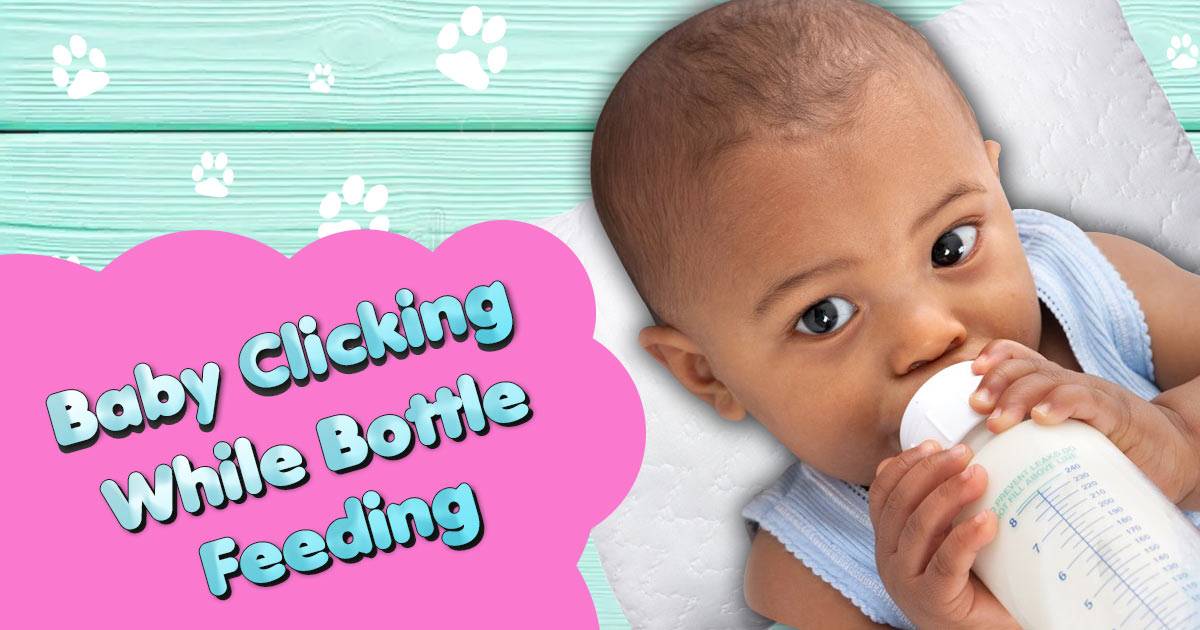Baby Clicking While Bottle Feeding: Causes, Solutions & When to Worry

Do you notice your baby making clicking sounds while feeding? This noise, often heard during bottle and breastfeeding, can signal feeding issues. Called a “clicking sound,” it happens when a baby’s tongue loses suction on the nipple, breaking the seal. Studies show that these sounds might point to underlying problems that need attention. Understanding and addressing these sounds is key to making feeding more comfortable and effective for both you and your baby.
When clicking occurs, it means the baby might be struggling to maintain proper suction, leading to potential feeding problems. Whether it’s bottle or breastfeeding, this can cause difficulties like improper milk transfer, discomfort, and even weight gain issues. Recognizing the causes and finding solutions can help fix these problems and improve feeding practices.
Possible Reasons for Babies Clicking Sound When Feeding
Poor Positioning
If your baby isn’t positioned correctly, they might struggle to latch properly, causing clicking sounds. Make sure their head is slightly tilted back and their body is aligned with the bottle or breast to prevent air intake and reduce clicking.
Bottle Nipple Issues
Feeding may be impacted by the bottle nipple’s size and type. If the flow of nipples is excessively fast or slow, your baby may gulp air and make clicking noises. Choose a nipple that matches your baby’s age and needs to help fix this.
Tongue or Lip Tie
When the tissue that joins the tongue or lip to the mouth is more taut than usual, tongue or lip ties occur. This may cause your baby to have difficulty latching, which could result in clicking noises. When treating patients, a physician or lactation consultant can make sure this is the case.
Forceful Letdown
A strong milk flow during breastfeeding can overwhelm your baby, causing them to lose suction and make clicking noises. This often comes with milk spilling from the sides of their mouth.
Engorgement
If your breasts are very full, it can be hard for your baby to latch on, causing clicking sounds as they lose suction. Reducing breast fullness can help improve their latch and reduce clicking.
Weak Tongue Strength
Weak tongue muscles can make it hard for your baby to maintain a good latch, leading to clicking sounds. Simple exercises can help strengthen their tongue and improve feeding.
Ways to Fix Clicking While Bottle Feeding or Breastfeeding
Proper Positioning Techniques
With your infant’s head slightly tipped back, hold them upright. For breastfeeding, keep their body lined up with yours. For bottle-feeding, tilt the bottle so the milk fills the nipple without trapping air. Try different positions to see what works best for your baby.
Choosing the Right Bottle Nipple
Pick a bottle nipple that fits your baby’s age and needs. A slow-flow nipple can help control the milk flow and reduce air intake. Experiment with different shapes and materials to find one that your baby likes.
Addressing Tongue or Lip Tie
If you think your baby has a tongue or lip tie, talk to a pediatrician or lactation consultant. They can check your baby’s mouth and suggest treatments if needed, like a small procedure to fix the tie.
Managing Forceful Letdown
If you’re breastfeeding and have a strong milk flow, try expressing some milk before feeding to make it easier for your baby. Using more upright or laid-back nursing positions can also help your baby handle the milk flow better.
Reducing Engorgement
To deal with engorged breasts, nurse or pump often to reduce fullness. Apply warm compresses prior to feeding and cool compresses following to reduce swelling and facilitate a successful latch-on for your child.
Strengthening Baby’s Tongue
Help strengthen your baby’s tongue by gently stimulating their lips and tongue with a clean finger. Encourage tongue movement by mimicking actions and using special teethers designed to improve tongue strength.
Regular Burping
To help relieve trapped air and lessen clicking noises, burp your baby frequently during and after feedings. Take breaks every few minutes to burp your baby, especially if they tend to swallow a lot of air.
Using Anti-Colic Bottles
To lessen the quantity of air your baby swallows during feeding, consider using anti-colic bottles with vents or valves. These bottles can help minimize air intake and reduce clicking sounds.
Seeking Professional Help
See a healthcare provider, such as a pediatrician or lactation consultant, if the clicking persists after attempting a number of different strategies. They can help address any underlying issues causing the clicking sound and provide tailored advice based on your baby’s unique needs.
You can try to stop the clicking noises during feedings and improve the experience for you and your baby by learning the reasons behind the sounds and applying these suggestions.
Benefits of Fixing Baby Clicking While Feeding Early
Fixing the clicking sounds your baby makes while feeding early on can be really helpful for both you and your baby. When you solve these issues quickly, your baby can feed more comfortably and effectively, which can reduce problems like poor weight gain, gas, and discomfort. This also means fewer challenges during feeding and a more enjoyable experience for you as a parent.
Taking steps to fix clicking sounds early helps set good feeding habits right from the start, which is important for your baby’s growth and development. By understanding the causes and using the solutions we’ve talked about, you can make feeding sessions smoother and easier, leading to a happier and healthier feeding time for both you and your baby.
If you still have difficulties, don’t hesitate to reach out to a professional for advice. Catching and fixing these issues early can make a big difference, ensuring your baby gets the nourishment they need in the most comfortable way possible.
